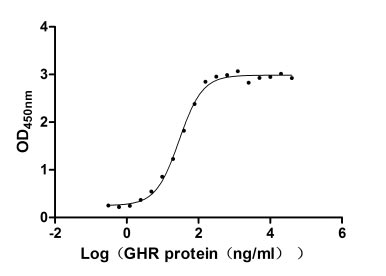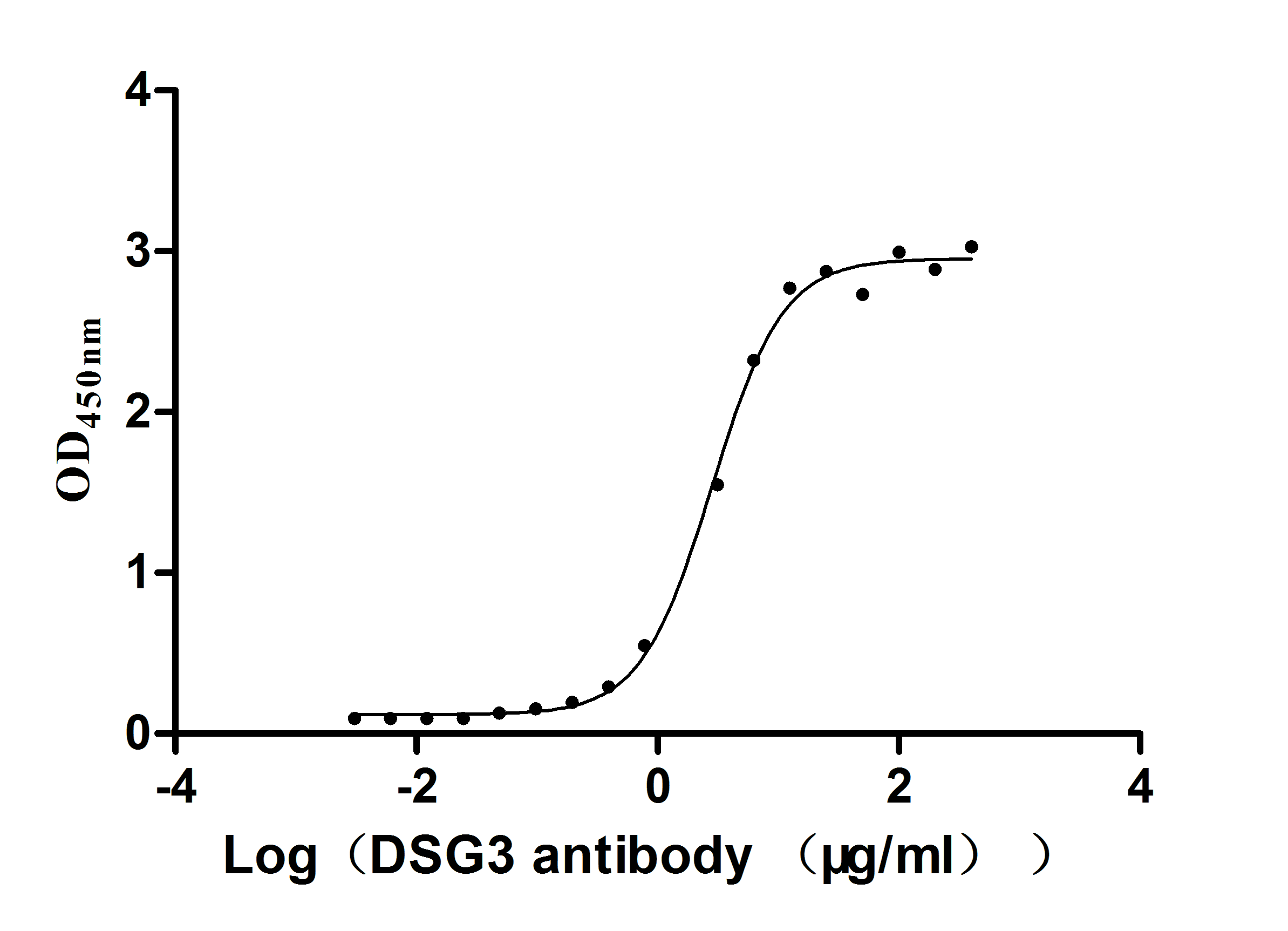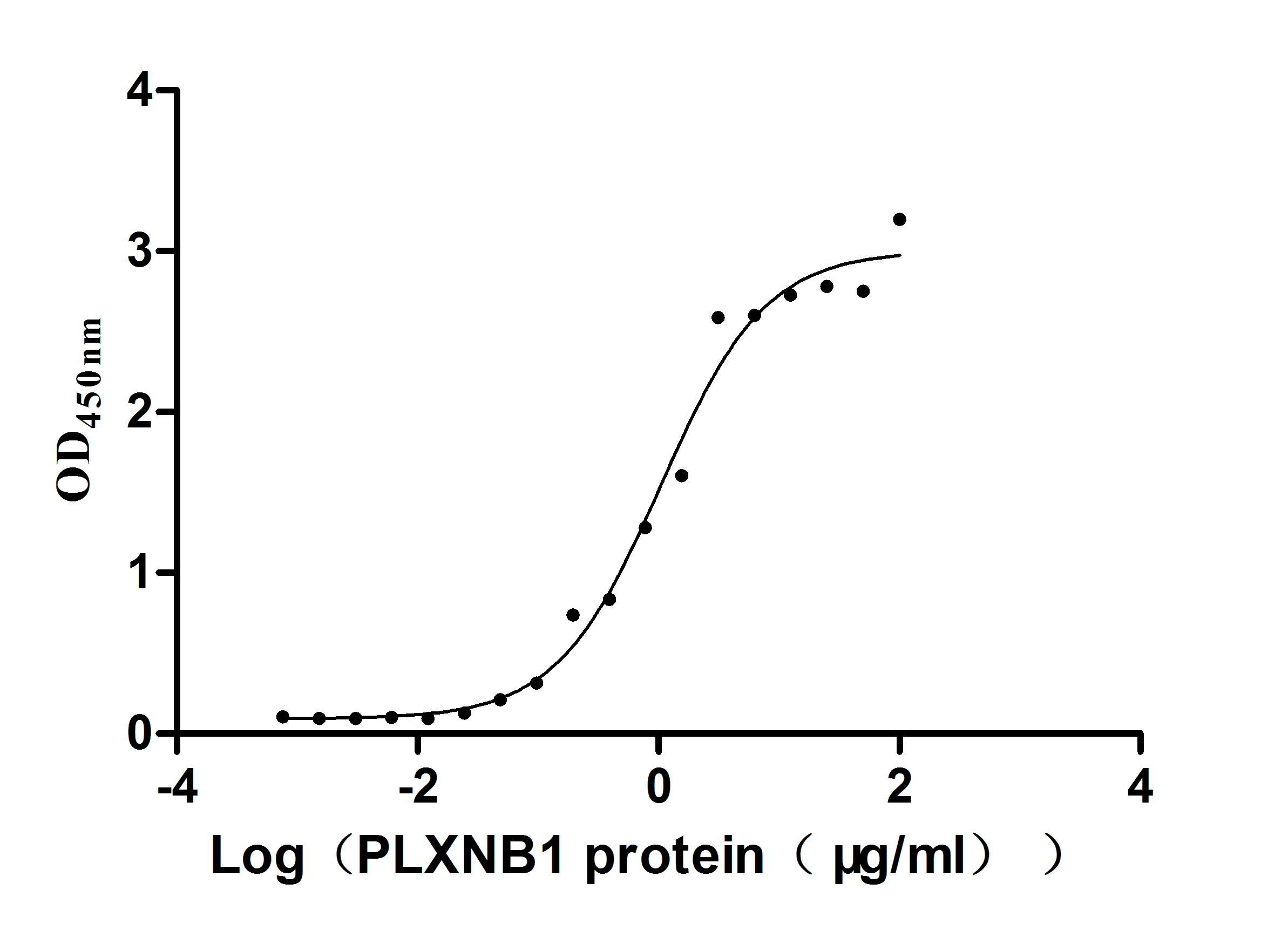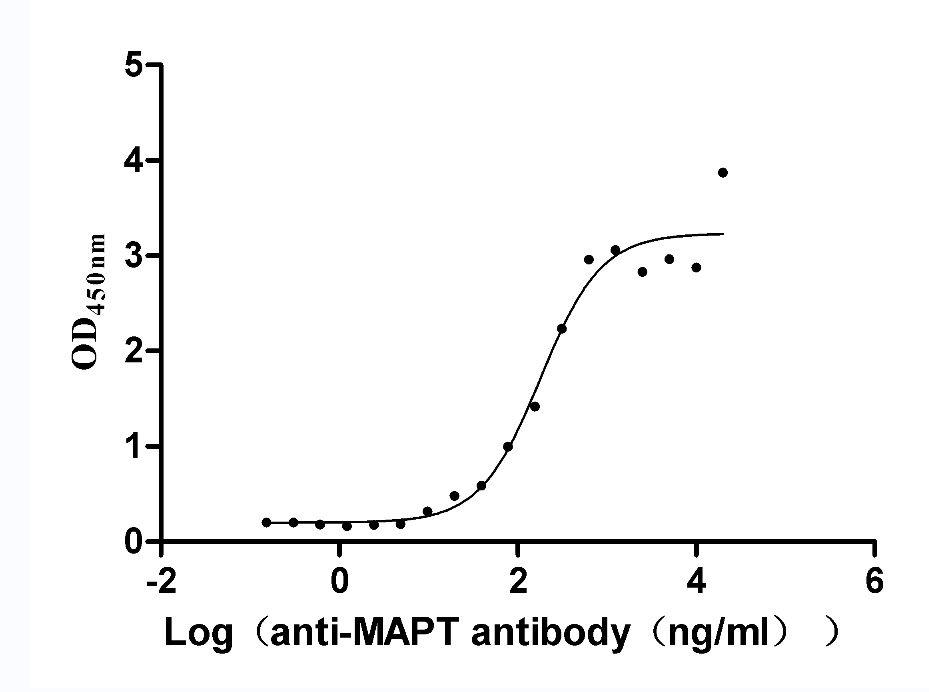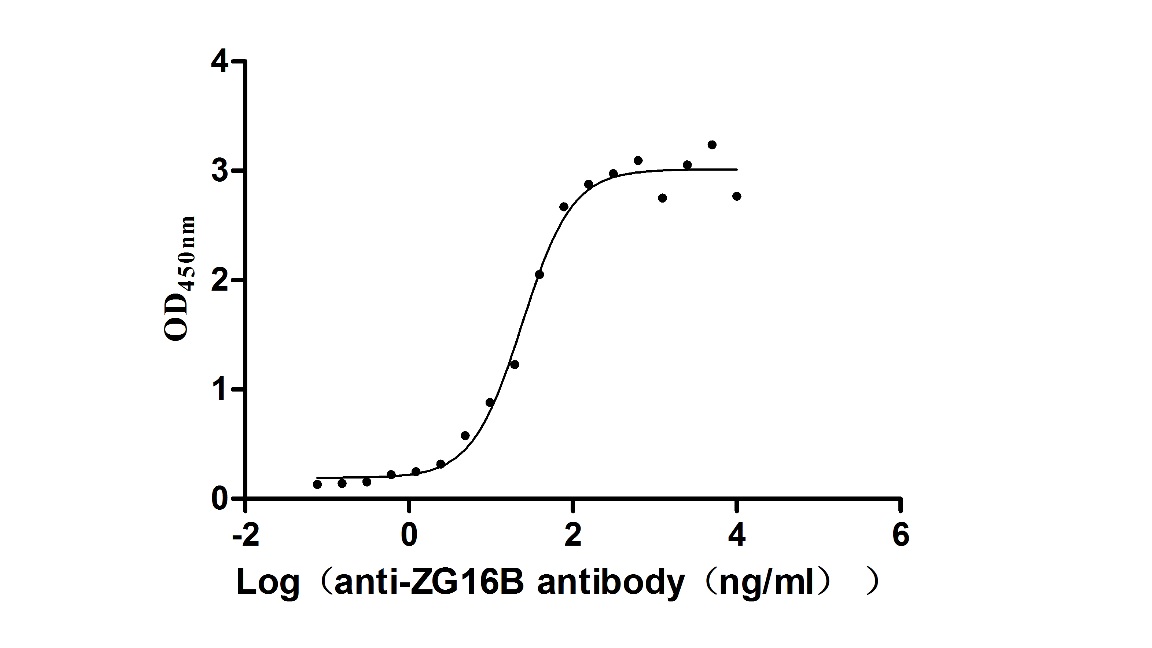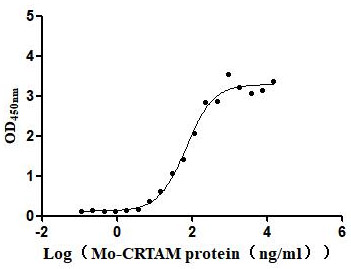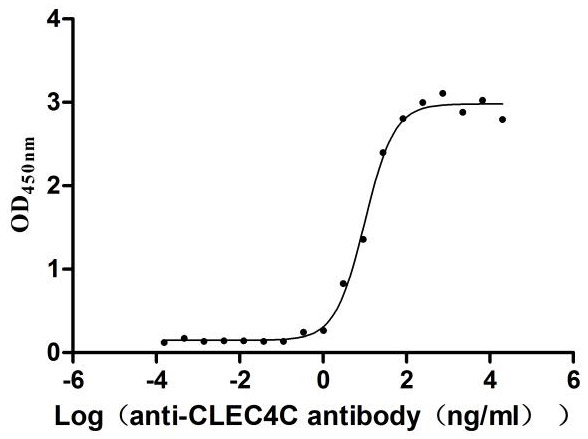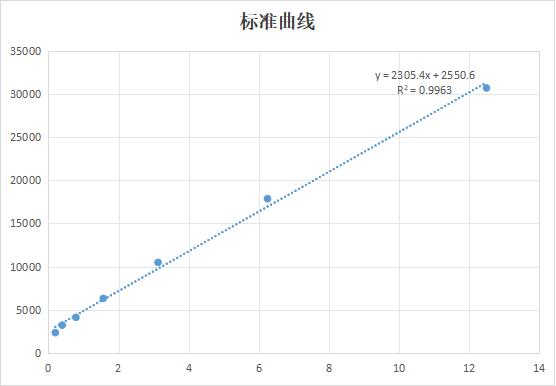Recombinant Human Hepatocyte nuclear factor 3-alpha (FOXA1)
-
货号:CSB-YP008794HU
-
规格:
-
来源:Yeast
-
其他:
-
货号:CSB-EP008794HU-B
-
规格:
-
来源:E.coli
-
共轭:Avi-tag Biotinylated
E. coli biotin ligase (BirA) is highly specific in covalently attaching biotin to the 15 amino acid AviTag peptide. This recombinant protein was biotinylated in vivo by AviTag-BirA technology, which method is BriA catalyzes amide linkage between the biotin and the specific lysine of the AviTag.
-
其他:
-
货号:CSB-BP008794HU
-
规格:
-
来源:Baculovirus
-
其他:
-
货号:CSB-MP008794HU
-
规格:
-
来源:Mammalian cell
-
其他:
产品详情
-
纯度:>85% (SDS-PAGE)
-
基因名:
-
Uniprot No.:
-
别名:forkhead box A1; Forkhead box protein A1; FOX A1; FOXA1; FOXA1_HUMAN; hepatocyte nuclear factor 3 alpha; Hepatocyte nuclear factor 3-alpha; HNF 3A; HNF-3-alpha; HNF-3A; HNF3A; MGC33105; TCF 3A; TCF-3A; TCF3A; Transcription factor 3A
-
种属:Homo sapiens (Human)
-
蛋白长度:Full length protein
-
表达区域:1-472
-
氨基酸序列MLGTVKMEGH ETSDWNSYYA DTQEAYSSVP VSNMNSGLGS MNSMNTYMTM NTMTTSGNMT PASFNMSYAN PGLGAGLSPG AVAGMPGGSA GAMNSMTAAG VTAMGTALSP SGMGAMGAQQ AASMNGLGPY AAAMNPCMSP MAYAPSNLGR SRAGGGGDAK TFKRSYPHAK PPYSYISLIT MAIQQAPSKM LTLSEIYQWI MDLFPYYRQN QQRWQNSIRH SLSFNDCFVK VARSPDKPGK GSYWTLHPDS GNMFENGCYL RRQKRFKCEK QPGAGGGGGS GSGGSGAKGG PESRKDPSGA SNPSADSPLH RGVHGKTGQL EGAPAPGPAA SPQTLDHSGA TATGGASELK TPASSTAPPI SSGPGALASV PASHPAHGLA PHESQLHLKG DPHYSFNHPF SINNLMSSSE QQHKLDFKAY EQALQYSPYG STLPASLPLG SASVTTRSPI EPSALEPAYY QGVYSRPVLN TS
-
蛋白标签:Tag type will be determined during the manufacturing process.
The tag type will be determined during production process. If you have specified tag type, please tell us and we will develop the specified tag preferentially. -
产品提供形式:Lyophilized powder
Note: We will preferentially ship the format that we have in stock, however, if you have any special requirement for the format, please remark your requirement when placing the order, we will prepare according to your demand. -
复溶:We recommend that this vial be briefly centrifuged prior to opening to bring the contents to the bottom. Please reconstitute protein in deionized sterile water to a concentration of 0.1-1.0 mg/mL.We recommend to add 5-50% of glycerol (final concentration) and aliquot for long-term storage at -20℃/-80℃. Our default final concentration of glycerol is 50%. Customers could use it as reference.
-
储存条件:Store at -20°C/-80°C upon receipt, aliquoting is necessary for mutiple use. Avoid repeated freeze-thaw cycles.
-
保质期:The shelf life is related to many factors, storage state, buffer ingredients, storage temperature and the stability of the protein itself.
Generally, the shelf life of liquid form is 6 months at -20°C/-80°C. The shelf life of lyophilized form is 12 months at -20°C/-80°C. -
货期:Delivery time may differ from different purchasing way or location, please kindly consult your local distributors for specific delivery time.Note: All of our proteins are default shipped with normal blue ice packs, if you request to ship with dry ice, please communicate with us in advance and extra fees will be charged.
-
注意事项:Repeated freezing and thawing is not recommended. Store working aliquots at 4°C for up to one week.
-
Datasheet :Please contact us to get it.
相关产品
靶点详情
-
功能:Transcription factor that is involved in embryonic development, establishment of tissue-specific gene expression and regulation of gene expression in differentiated tissues. Is thought to act as a 'pioneer' factor opening the compacted chromatin for other proteins through interactions with nucleosomal core histones and thereby replacing linker histones at target enhancer and/or promoter sites. Binds DNA with the consensus sequence 5'-[AC]A[AT]T[AG]TT[GT][AG][CT]T[CT]-3'. Proposed to play a role in translating the epigenetic signatures into cell type-specific enhancer-driven transcriptional programs. Its differential recruitment to chromatin is dependent on distribution of histone H3 methylated at 'Lys-5' (H3K4me2) in estrogen-regulated genes. Involved in the development of multiple endoderm-derived organ systems such as liver, pancreas, lung and prostate; FOXA1 and FOXA2 seem to have at least in part redundant roles. Modulates the transcriptional activity of nuclear hormone receptors. Is involved in ESR1-mediated transcription; required for ESR1 binding to the NKX2-1 promoter in breast cancer cells; binds to the RPRM promoter and is required for the estrogen-induced repression of RPRM. Involved in regulation of apoptosis by inhibiting the expression of BCL2. Involved in cell cycle regulation by activating expression of CDKN1B, alone or in conjunction with BRCA1. Originally described as a transcription activator for a number of liver genes such as AFP, albumin, tyrosine aminotransferase, PEPCK, etc. Interacts with the cis-acting regulatory regions of these genes. Involved in glucose homeostasis.
-
基因功能参考文献:
- High FOXA1 expression is associated with the pathogenesis of gastric cancer. PMID: 30066917
- FoxA1 might be related to the development and differentiation of secretory coil-like structures, as well as the secretory function of the 3D reconstructed eccrine sweat glands. PMID: 29909922
- TUG1 promoted osteosarcoma cell proliferation and suppressed apoptosis by regulating the miR-212-3p/FOXA1 axis. PMID: 29793327
- miR-760 should be considered as a tumor suppressor since it negatively regulates the oncogene protein FOXA1 and regulated TRAIL sensitivity in Non-small cell lung cancer cells. PMID: 29665655
- As a tumor suppressor, FOXA1 targets PIK3R1 directly to inhibit PI3K/Akt signaling pathway, thus exerting a negative regulatory effect on proliferation, migration, and invasion of HCC in male patients. PMID: 29208003
- miR212 suppresses renal cell carcinoma (RCC) proliferation and invasion by modulating FOXA1, suggesting that miR212 may have potential as a therapeutic target in RCC. PMID: 29115609
- the results of the present study suggested that FOXA1 is a potential oncogene in NSCLC PMID: 29115441
- During the ensuing weeks, the PAX2/FOXA1 boundary progressively extended cranially such that by 21 weeks the entire vaginal epithelium was FOXA1-reactive and PAX2-negative. This observation supports Bulmer's proposal that human vaginal epithelium derives solely from urogenital sinus epithelium PMID: 28918284
- The transcription factor FOXA1 directly bound to the PLOD2 promoter, and turned on PLOD2 transcription. In summary, our findings revealed a regulatory mechanism of NSCLC metastasis through EGFR-PI3K/AKT-FOXA1-PLOD2 pathway. PMID: 29072684
- maintenance of the cancer cell state is dependent on recruitment of Mediator and Cohesin through FOXA and master transcription factors PMID: 27739523
- overexpression of GATA3 and FOXA1 cooperate with PPAR activation to drive transdifferentiation of a basal bladder cancer cells to a luminial phenotype. PMID: 27924948
- Results found FOXA1 to be hypermethylated in breast tumors from African American (AA) versus European American (EA) women with ER- cancer, and methylation levels showed strong inverse relationships with both mRNA and protein levels. A significant positive association was identified between parity and FOXA1 methylation in tumors from AA women who did not breastfeed. PMID: 28756535
- High expression of FOXA1 is associated with breast tumor. PMID: 28534958
- High FOXA1 expression was significantly associated with presence of lymph node metastasis (LNM), low tumour-infiltrating lymphocytes (TILs), and submucosal invasion. PMID: 28843920
- Results provide evidence that the atypical expression of FOXA1 transcriptional factor is an important player in psoriasis, as it inhibits maturation of naive T cells into a Treg subpopulation, therefore contributing to the development of psoriatic skin lesions. PMID: 28849568
- s demonstrated that ER(alpha), GATA3 and FOXA1 form a transcriptional complex with Ell3 to regulate IL-20 expression in ER(+) breast cancer cells. FOXA1 represses IL-20 expression, whereas GATA3 and ER(alpha) activate it. PMID: 28514748
- the findings show that squamous and micropapillary bladder cancers have different expression patterns of CK14 and FOXA1 and suggest that they arise from distinct precursors. PMID: 28721490
- rs4442975 may not confer a risk of breast cancer occurrence or progression in the Chinese Han population. PMID: 27835577
- As a transcriptionally regulated program, urothelial differentiation operates as a heterarchy, wherein GATA3 is able to co-operate with FOXA1 to drive expression of luminal marker genes, but that P63 has potential to transrepress expression of the same genes. PMID: 28282036
- FOXA1 overexpression mediates endocrine resistance by altering the ER transcriptome and IL-8 expression in ER-positive breast cancer. PMID: 27791031
- Findings suggested FOXA1 may act as an anti-oncogene in gastric cancer (GC) cells. Low-level expression of FOXA1 protein was confirmed in GC tissues and cell lines. FOXA1 over-expression could significantly affect cell proliferation, apoptosis and tumor invasion of GC cells, which may be resulted by reversing EMT. PMID: 29129808
- High expression of FOXA1 is an independent prognostic parameter in ERG negative prostate cancer PMID: 29029032
- A molecular mechanism by which Estradiol antagonizes GR-dependent induction of specific genes by preventing the recruitment of the pioneer factors FOXA1 and FOXA2 in a physiologically relevant model. PMID: 28938408
- Results show that c-Abl phosphorylates FoxA1 at multiple sites. Tyr429 and Tyr464 were identified as the major phosphorylation sites in the FoxA1 C-terminal region. This c-Abl-mediated phosphorylation of FoxA1 promotes the activation of estrogen signaling by inducing its binding to histones. PMID: 27883218
- MLL3 binding was dependent on FOXA1, indicating that FOXA1 recruits MLL3 to chromatin. MLL3 silencing decreased H3K4me1 at enhancer elements but had no appreciable impact on H3K4me3 at enhancer elements. We propose a mechanism whereby the pioneer factor FOXA1 recruits the chromatin modifier MLL3 to facilitate the deposition of H3K4me1 histone marks, subsequently demarcating active enhancer elements PMID: 27926873
- FoxA1 discriminates between medullary thyroid carcinoma and tumors of follicular derivation with sensitivity and specificity greater than calcitonin and carcinoembryonic antigen. PMID: 28546130
- FOXA1 loss may play a significant role in enabling prostate cancer progression to neuroendocrine prostate cancer, whereas IL-8 and MAPK/ERK pathways may be promising targets for therapeutic intervention. PMID: 28319070
- Low FOXA1 expression is associated with breast cancer invasion and metastasis. PMID: 27524420
- the distinct mechanisms by which GATA2 and FOXA1 regulate AR cistrome and suggest that FOXA1 acts upstream of GATA2 and AR in determining hormone-dependent gene expression in prostate cancer. PMID: 26751772
- Study implicates enhancer reprogramming, FOXA1 upregulation, and a retrograde developmental transition in pancreatic ductal adenocarcinoma metastasis. PMID: 28757253
- Studies indicate that microRNA miR-212 exerts its inhibitory effect on hepatocellular carcinoma (HCC) by inhibiting forkhead transcription factor FOXA1 expression. PMID: 27999212
- FOXA1 is expressed by basal cells of squamous epithelium, pre-invasion lesions of the uterine cervix and the head/neck and almost half invasive cervical and head/neck carcinomas, supporting its possible implication in HPV associated carcinomas. PMID: 28209524
- CREB1/FoxA1 signaling is a targetable driver of prostate cancer progression and serves as a biomarker of poor clinical outcomes. PMID: 26743006
- miR-93 may promote the process of epithelial-mesenchymal transition in endometrial carcinoma cells by targeting FOXA1. PMID: 27829043
- conclusion, our results demonstrated that miR24 inhibits breast cancer cells invasion by targeting OGT and reducing FOXA1 stability. These results also indicated that OGT might be a potential target for the diagnosis and therapy of breast cancer metastasis. PMID: 28455227
- FOXA1 is not only able to recognize but also remodel the epigenetic signatures at lineage-specific enhancers, which is mediated, at least in part, by a feed-forward regulatory loop between FOXA1 and TET1. PMID: 27257062
- Based on these results, we suggest that FOXA1 plays a catalytic role in ovarian cancer pathogenesis and development by affecting the expression of the above-mentioned proteins. PMID: 28488543
- these results suggest that FOXA1 suppresses expression of IL6 through inhibition of NF-kappaB recruitment to the IL6 promoter in an ERalpha-independent manner and that reduction in FOXA1 expression induces IL6 expression and contributes to cancer stem cell-like properties in TAM-R cells. PMID: 28270510
- These results suggest a positional-nucleosome-oriented accessing model for Pioneer factors seeking target motifs, in which FOXA1 can examine each underlying DNA nucleotide. PMID: 27458208
- Down-regulation of TRPS1 by miR-373, acting as a transcriptional activator, promotes epithelial-mesenchymal transition (EMT) and metastasis by repressing FOXA1 transcription, expanding upon its previously reported role as a transcription repressor. PMID: 26969828
- FOXA1 is found in ovarian mucinous and Brenner tumours PMID: 28238418
- the results of the present study indicated that FOXA1 may be considered a potential prognostic marker, and may promote tumor growth of CRC by upregulating YAP expression. PMID: 27484093
- meta-analysis showed that high expression of FOXA1 in breast cancer patients was a good prognostic indicator for survival outcome. PMID: 27212698
- FOXA1 promotes cell senescence in EC by interaction with p16INK4a. PMID: 27349269
- There is significantly increased esophageal squamous cell carcinoma risk associated with the FOXA1 rs7144658 T > C polymorphism among male patients. PMID: 27050876
- Meta-analysis results clearly point to an important role of FOXA1 and FOXA2 gene regulatory networks in the etiology of Alzheimer's disease PMID: 26890743
- show that ER and GR both have the ability to alter the genomic distribution of the FoxA1 pioneer factor. Single-molecule tracking experiments reveal a highly dynamic interaction of FoxA1 with chromatin in vivo; FoxA1 factor is not associated with footprints at its binding sites throughout the genome; findings support a model wherein interactions between transcription factors and pioneer factors are highly dynamic. PMID: 27062924
- findings suggest a key role for GalNAc-T4 in the estrogen pathway through FOXA1 glycosylation PMID: 26541755
- The ratio of FoxA1 to FoxA2 in lung adenocarcinoma is regulated by LncRNA HOTAIR and chromatin remodeling factor LSH PMID: 26658322
- Loss of Interdependent Binding by the FoxO1 and FoxA1/A2 Forkhead Transcription Factors Culminates in Perturbation of Active Chromatin Marks and Binding of Transcriptional Regulators at Insulin-sensitive Genes. PMID: 26929406
显示更多
收起更多
-
亚细胞定位:Nucleus.
-
组织特异性:Highly expressed in prostate and ESR1-positive breast tumors. Overexpressed in esophageal and lung adenocarcinomas.
-
数据库链接:
HGNC: 5021
OMIM: 602294
KEGG: hsa:3169
STRING: 9606.ENSP00000250448
UniGene: Hs.163484
Most popular with customers
-
Recombinant Human Growth hormone receptor (GHR), partial (Active)
Express system: Mammalian cell
Species: Homo sapiens (Human)
-
Recombinant Mouse Desmoglein-3 (Dsg3), partial (Active)
Express system: Mammalian cell
Species: Mus musculus (Mouse)
-
Recombinant Human Plexin-B1 (PLXNB1), partial (Active)
Express system: Mammalian cell
Species: Homo sapiens (Human)
-
Recombinant Rat Microtubule-associated protein tau (Mapt) (Active)
Express system: Mammalian cell
Species: Rattus norvegicus (Rat)
-
Recombinant Macaca fascicularis zymogen granule protein 16 homolog B (ZG16B) (Active)
Express system: Mammalian cell
Species: Macaca fascicularis (Crab-eating macaque) (Cynomolgus monkey)
-
Recombinant Mouse Cell adhesion molecule 1 (Cadm1), partial (Active)
Express system: Mammalian cell
Species: Mus musculus (Mouse)
-
Recombinant Human C-type lectin domain family 4 member C (CLEC4C), partial (Active)
Express system: Mammalian cell
Species: Homo sapiens (Human)
-
Recombinant Human Urokinase-type plasminogen activator(PLAU) (Active)
Express system: Mammalian cell
Species: Homo sapiens (Human)


